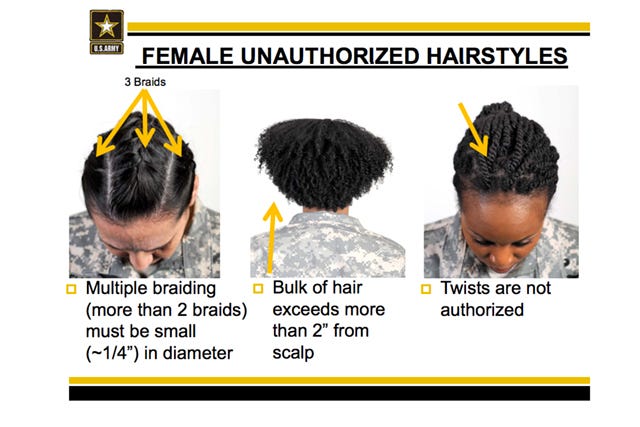New Army Regulations Pose A Problem For Women With Naturally Textured Hair
 Illustrated by Ly Ngo.
Illustrated by Ly Ngo.On March 31, the Army released an update to its Army Regulation 670-1, along with an educational PDF to assist leaders in instructing soldiers on acceptable forms of grooming. The PDF included clarifications for both male and female soldiers. Though the 60-page document is loaded with new information, one piece in particular has received a lot of attention: "Twisting two distinct strands of hair around one another to create a twisted rope-like appearance" — a popular style among black female soldiers — is now forbidden. And, in case there's any confusion, there's a collection of images that illustrate exactly what they mean. In response to the ban, Sgt. Jasmine Jacobs started a petition asking the White House to reconsider the changes to AR 670-1, as they "offer little to no options for females with natural hair." And, she's got a point.
AdvertisementADVERTISEMENT
 Photo: Courtesy of U.S. Army.
Photo: Courtesy of U.S. Army.This feels especially true when we see the choice of illustrations in the document. You'll notice the prohibited styles are largely portrayed by black women. You'll also notice the example of an acceptable hairstyle is an illustration of a white woman wearing a low bun — a hairstyle many natural-haired women cannot successfully replicate according to the new standards. As Jones explained The Army Times, women with natural hair can't always pull it into a secure bun. "Most black women, their hair doesn't grow straight down. It grows out." That leaves very few hairstyle choices for a woman with natural hair.
 Photo: Courtesy of U.S. Army.
Photo: Courtesy of U.S. Army.We have the utmost respect for the armed forces. But, what's frustrating about AR 670-1 is that in one fell swoop, it makes potentially offensive gender- and racially biased statements. To be sure, the update contains some questionable rules for women of color. But, what's odd is these rules run alongside stringent regulations against sexist or racist tattoos. The rules define sexist as " those that advocate a philosophy that degrades or demeans a person based on gender" and racist as "those that advocate a philosophy that degrades or demeans a person based on race, ethnicity, or national origin."
AR 670-1 is a product of a much larger issue that exists within both our armed forces and our government: It is often men who are creating rules for women and their bodies. The result is a disconnect between the Army's expectations and what's realistic for more than 30% of its soldiers — not to mention a feeling of a pointed finger at women of color. It's important to have grooming standards in the armed forces so our men and women are in uniform and at their most efficient while on duty. But, there seems to be a disconnect between what the Army expects of its natural-haired female soldiers and what's realistic. And, we expect it's not because the Army has racist or sexist intentions, but because there isn't a female voice offering feedback when the rules are being written.
Like this post? There's more. Get tons of beauty tips, tutorials, and news on the Refinery29 Beauty Facebook page!
AdvertisementADVERTISEMENT






